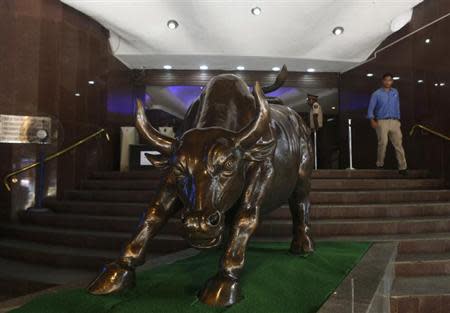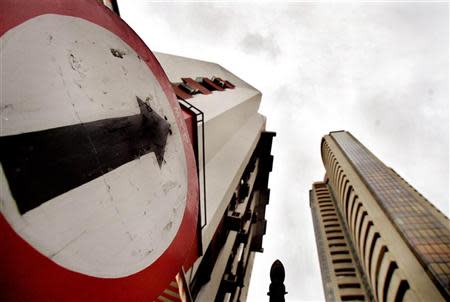Sensex hits life high above 21,500 on foreign buying
By Abhishek Vishnoi MUMBAI (Reuters) - The BSE Sensex hit a record high while Nifty closed just off its all-time high, as steady buying by foreign investors continued to drive a rally in blue chips such as ICICI Bank. The Sensex's record high of 21,525.14 surpassed its previous historic milestone of 21,483.74 hit on December 9 last year. Nifty ended only 0.2 percent off its record of 6,415.25 hit on the same date. The strong rally has defied expectations that foreign investors would grow more cautious as the Federal Reserve continues to withdraw its monetary stimulus and ahead of the general elections set to kick off on April 7. Instead, overseas investors have bought heavily into India as a sharply narrowing current account deficit and a more stable rupee have increased confidence in a country that only last year was in the midst of its biggest market turmoil since the balance of payments crisis of 1991. Overseas investors bought Indian shares worth $119.46 million on Wednesday, extending their buying streak to a 14th consecutive day for a net of about $900 million, provisional exchange data showed. "It's a little more than what we had really expected. Pre-election run up is helping but some short term correction is possible," said Paras Adenwala, managing director at Capital Portfolio Advisors. BSE Sensex rose 1.11 percent, or 237.01 points, to end at 21,513.87, having gained 4.9 percent since the start of February. Nifty gained 1.15 percent, or 72.50 points, to end at 6,401.15. The rally comes at a time when foreign investors have been buyers of Indian shares for 14 consecutive sessions for a net total of about $900 million. India is the only share market after Indonesia to turn positive for the year among the "Fragile Five" economies, or those countries whose large current account deficits were seen as making them particularly vulnerable to foreign outflows. In India, the current account deficit has narrowed sharply, to 0.9 percent of gross domestic product in the October-December quarter, according to data on Wednesday, improving sharply from the record high of 4.8 percent of GDP in the year ended in March 2013. The improving current account deficit, and the strong foreign inflows, have also boosted the rupee, which is up 12.2 percent since hitting a record low in late August. Blue chips have been the main drivers of the rally. On Thursday, ICICI Bank gained 3.1 percent and Reliance Industries rose 1.9 percent. The gains were widespread with the BSE mid-cap index rising 1.21 percent, including a 3.6 percent gain in Crompton Greaves . The small-cap index <.BSESC> ended up 1.22 percent. Shares that are part of billionaire Anil Ambani's group were also noticeable gainers: Reliance Infrastructure rose 9.9 percent, while Reliance Power gained 5.2 percent. Among stocks that fell, AstraZeneca Pharma India plunged 9.2 percent after its board late on Wednesday deferred a proposal to delist the company. Tata Motors also fell 0.3 percent, adding to Wednesday's 0.8 percent loss, on profit-taking after marking its record high of 420.70 rupees on Tuesday. (Additional reporting by Indulal PM and Dipika Lalwani; Editing by Rafael Nam and Anupama Dwivedi)

 Yahoo Finance
Yahoo Finance 


